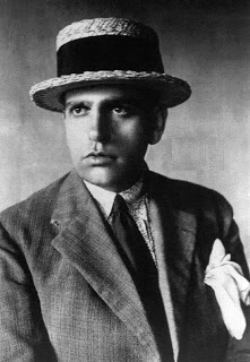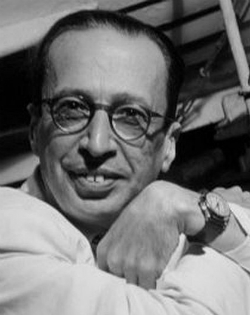The first phase of Modernism in Brazil is highlighted by the authors: Mário de Andrade, Oswald de Andrade, Manuel Bandeira and Alcântara Machado.
Remember that modernism in Brazil began with the Week of Modern Art in 1922. Called the "heroic phase", it goes until 1930 when the second modernist generation begins.
1. Mario de Andrade
the paulista Mario de Andrade (1893-1945) was a multifaceted intellectual and played a decisive role in the modernist movement. At the age of 20, he published his first book: There's a Drop of Blood in Every Poem.
In addition to literature, he has also been active in music, folklore, anthropology, ethnography and psychology. He was a pianist, music teacher and composer.

His knowledge was of fundamental importance for the theoretical foundation of the modernist movement in Brazil.
Its characteristics are free verse, neologism and fragmentation. Also found in his work is the way of speaking of the sertão, the legends and regional customs, in addition to popular dances.
After the 1930 revolution, his poetry became intimate, emphasizing the fight against social injustices, supported by an aggressive and explosive language.
Beautiful girl well treated
Beautiful, well-groomed girl,
Three centuries of family,
Dumb as a door:
A love.
Fine of shamelessness,
Sport, ignorance and sex,
Donkey as a door:
One thing.
fat woman, fillet,
of gold through every pore
Dumb as a door:
Patience…
Unconscious plutocrat,
nothing door, earthquake
That the poor man's door breaks down:
A bomb.
2. Oswald de Andrade
the paulista Oswald de Andrade (1890-1954) worked in a journalistic career and was a member of the Communist Party, although of bourgeois origin.
In 1911, in partnership with Alcântara Machado and Juó Bananère, he founded the magazine "O Pirralho", which lasted until 1917. In 1926, he marries Tarsila do Amaral and, in 1930, the communist writer Patrícia Galvão, Pagu.

The following year he joined the Communist Party, where he remained until 1945. It was during this period that he wrote "Manifesto Antropofágico", as well as "Serafim Ponte Grande", a novel, and the play "O Rei da Vela".
His work is characterized by debauchery, irony and criticism of academic circles and the bourgeoisie. Defender of valuing the origins and past of the country.
Pronominals
give me a cigarette
says the grammar
from the teacher and the student
And from the known mulatto
But the good black and the good white
of the Brazilian nation
they say every day
leave it comrade
Give me a cigarette
3. Manuel Bandeira
Recife poet, Manuel Bandeira (1886-1968) was one of those responsible for consolidating the modernist movement in Brazil.
Manuel Bandeira's work had European influence as he was in Europe looking for treatment for his tuberculosis. There, he met the French Dada writer Paul Élaurd, who put him in contact with European innovations. That's how he starts to manifest free verse.

Bandeira's poetry is full of poetic lyricism and freedom. He is a fan of free verse, colloquial language, irreverence and creative freedom. His verses are full of construction and meaning.
Poem taken from a newspaper story
João Gostoso was a free-market porter and lived on Babilônia hill in an unnumbered shed
One night he arrived at the bar Vinte de Novembro
drank
Sang
danced
Then he threw himself into Lagoa Rodrigo de Freitas and drowned.
4. Alcantara Ax
Antônio de Alcântara Machado (1901-1935) graduated in Law and worked as a theater critic at Jornal do Comércio.
He identified with the popular essence and valued in his poetry the proletariat and the petty bourgeoisie.

He was an editor and contributor to the modernist publications: Terra Roxa et al., Revista de Antropofagia and Revista Nova.
With a light, humorous and spontaneous language, Machado wrote chronicles, short stories, novels and essays. His work that deserves to be highlighted is the collection of short stories Brás, Bexiga and Barra Funda.
"But when it hit Carlino Pantaleoni, owner of QUITANDA BELLA TOSCANA, to come and join the group, there was once a time silence. He talked so much he didn't even stop in his chair. He paced back and forth. With big gestures. And he was a bastard: he quoted Dante Alighieri and Leonardo da Vinci. Only these. But also without hesitation. And twenty times every ten minutes. Bastard.
The subject already knows: Italy. Italy and more Italy. Because Italy this, because Italy that. And Italy wants it, Italy does it, Italy is it, Italy sends it.
Giacomo was less Jacobin. Tranquillo was too much. He was quiet however.
É. He was quiet. But he went to sleep with that idea in his head: to go home.
Dona Emilia shrugged her shoulders."
(Excerpt from the work Brás, Bexiga and Barra Funda)
read more:
- Modernism in Brazil
- First Generation Modernist
- Modernism in Brazil: Characteristics and Historical Context
- Modern Art Week
- Authors of the second modernist phase
- Exercises on the first modernist generation (1st phase of modernism)
- Macunaíma

